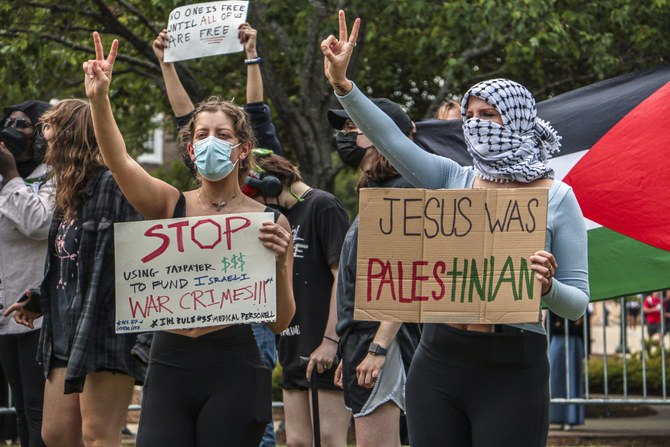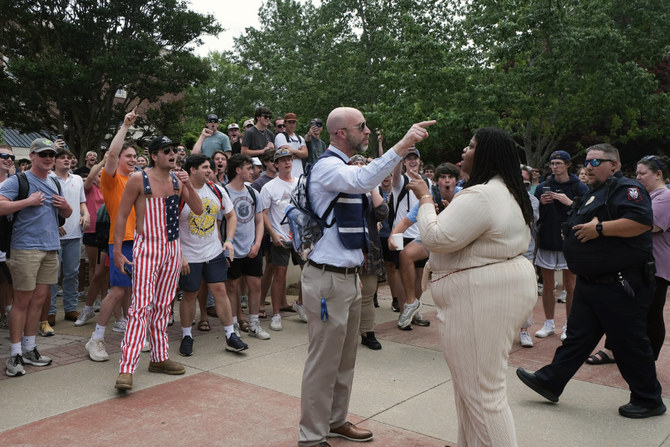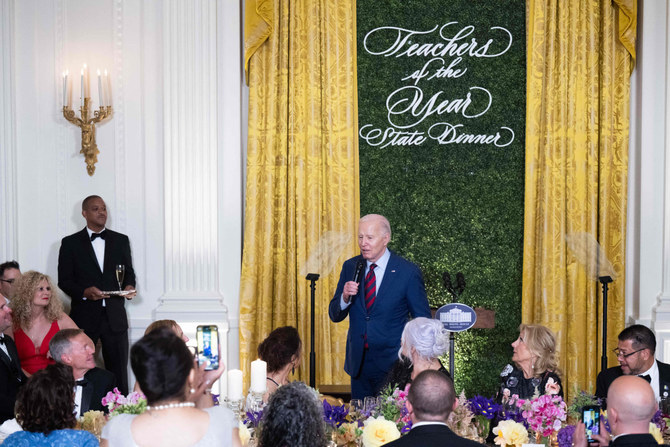WASHINGTON: President Joe Biden on Thursday rejected calls from student protesters to change his approach to the war in Gaza while insisting that “order must prevail” as college campuses across the country face a wave of violence, outrage and fear.
“Dissent is essential for democracy,” Biden said at the White House. “But dissent must never lead to disorder.”
The Democratic president broke days of silence on the protests with his remarks, which followed mounting criticism from Republicans who have tried to turn scenes of unrest into a campaign cudgel. By focusing on a law-and-order message while defending the right to free speech, Biden is grasping for a middle ground on an intensely divisive issue in the middle of his reelection campaign.
He largely sidestepped protesters’ demands, which have included ending US support for Israeli military operations. Asked after his remarks whether the demonstrations would prompt him to consider changing course, Biden responded with a simple “no.”
Biden said that he did not want the National Guard to be deployed to campuses. Some Republicans have called for sending in troops, an idea with a fraught history. Four students were shot and killed at Kent State University by members of the Ohio National Guard during protests over the Vietnam War in 1970.
Tensions on college campuses have been building for days as demonstrators refuse to remove encampments and administrators turn to police to clear them by force, leading to clashes that have seized widespread attention.
Biden said he rejected efforts to use the situation to “score political points,” calling the situation a “moment for clarity.”
“There’s the right to protest, but not the right to cause chaos,” Biden said shortly before leaving the White House for a trip to North Carolina. “People have the right to get an education, the right to get a degree, the right to walk across campus safely without fear of being attacked.”
The White House also maintained its focus on combating antisemitism. Doug Emhoff, husband of Vice President Kamala Harris, spoke to Jewish students and Hillel leaders on Thursday to hear about their experience with threats and hate speech, according to a White House official.
Biden will make his own visit to a college campus on May 19 when he’s scheduled to deliver the commencement address at Morehouse University in Atlanta.
His last previous public comment on the demonstrations came more than a week ago, when he condemned “antisemitic protests” and “those who don’t understand what’s going on with the Palestinians.”
The White House, which has been peppered with questions by reporters, had gone only slightly further than the president. On Wednesday, press secretary Karine Jean-Pierre said that Biden was “monitoring the situation closely” and that some demonstrations had stepped over a line that separated free speech from unlawful behavior.
“Forcibly taking over a building,” such as what happened at Columbia University in New York, “is not peaceful,” she said. “It’s just not.”
Biden’s latest remarks weren’t well received in some corners of the Democratic Party.
“We need to prevent lawlessness in society. We need to have protections against hate speech,” said a social media post from Patrick Gaspard, president of the Center for American Progress and a former White House political director under President Barack Obama. “But we need to be able to hold space for active dissent and activism that is discomforting without blanket accusations of hate and violence against all activists.”
But Biden’s team has expressed confidence that his stance appeals to the widest array of voters. It also echoes his approach to nationwide unrest after the murder of George Floyd by a police officer four years ago, a politically volatile situation in the middle of his campaign against then-President Donald Trump.
“I want to make it absolutely clear rioting is not protesting, looting is not protesting,” Biden said then in remarks that his team turned into an advertisement. “It’s lawlessness, plain and simple, and those that do it should be prosecuted.”
Biden has never been much for protests of any kind. His career in elected office began as a county official when he was only 28 years old, and he’s always espoused the political importance of compromise.
As college campuses convulsed with anger over the Vietnam War in 1968, Biden was in law school at Syracuse University.
“I’m not big on flak jackets and tie-dyed shirts,” he said years later. “You know, that’s not me.″
The White House has also maintained its focus on combating antisemitism. Doug Emhoff, husband of Vice President Kamala Harris, spoke to Jewish students and Hillel leaders on Thursday to hear about their experience with threats and hate speech, according to a White House official.
Despite the administration’s criticism of violent college protests and Biden’s refusal to heed demands to cut off US support for Israel, Republicans blame Democrats for the disorder and have used it as a backdrop for press conferences.
“We need the president of the United States to speak to the issue and say this is wrong,” House Speaker Mike Johnson, a Louisiana Republican, said on Tuesday. “What’s happening on college campuses right now is wrong.”
Johnson visited Columbia University with other members of his caucus last week. House Republicans sparred verbally with protesters while speaking to the media at George Washington University in Washington, D.C., on Wednesday.
Trump, who is running for another term as president, also criticized Biden in an interview with Sean Hannity on Fox News.
“Biden has to do something,” he said. “Biden is supposed to be the voice of our country, and it’s certainly not much of a voice. It’s a voice that nobody’s heard.”
He repeated his criticisms on Wednesday during a campaign event in Waukesha, Wisconsin.
“The radical extremists and far-left agitators are terrorizing college campuses, as you possibly noticed,” Trump said. “And Biden’s nowhere to be found. He hasn’t said anything.”
Kate Berner, who served as deputy communications director for Biden’s campaign in 2020, said Republicans already had tried the same tactic during protests over Floyd’s murder.
“People rejected that,” she said. “They saw that it was just fearmongering. They saw that it wasn’t based in reality.”
Apart from condemning antisemitism, the White House has been reluctant to directly engage on the issue.
Jean-Pierre repeatedly deflected questions during a briefing on Monday.
Asked whether protesters should be disciplined by their schools, she said “universities and colleges make their own decisions” and “we’re not going to weigh in from here.”
Pressed on whether police should be called in, she said “that’s up to the colleges and universities.”
Asked on Thursday why Biden chose to speak on the matter after police had arrested protesters at the University of California, Los Angeles and at universities in New York City, Jean-Pierre stressed instead the importance of any protests being nonviolent.
“We’ve been very consistent here,” she said. “Americans have the right to peacefully protest as long as it’s within the law and violence is not protected.”





























